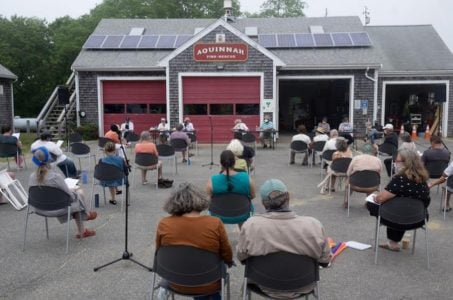Harvard Says Pandemic Casino Shutdown Is ‘Immediate Threat’ to Native Americans
Posted on: April 22, 2020, 03:14h.
Last updated on: April 22, 2020, 04:01h.
US tribes urgently need financial help from the federal government after casinos and other money-making operations were abruptly shuttered by the coronavirus outbreak, according to a Harvard University study. Tribal governments could lose billions of dollars in revenue from closed gaming properties and other former sources, the research adds.

The concerns and findings were sent by the Harvard Project on American Indian Economic Development to Treasury Secretary Steven Mnuchin last week. He has yet to formally respond.
In a recent interview, Joseph P. Kalt, co-director of the Harvard project, told Medium that the COVID-19 outbreak led to an “abrupt shutdown of most of these tribal enterprises.” The closures impact both the tribes and wider regional economies.
We’re not aware of a single tribal casino, for example, that is open anywhere in the United States,” Kalt said. “Tribes have seen their revenues cut to zero, abruptly.”
“The COVID-19 crisis poses an immediate threat to three decades of improvement in economic conditions across Indian Country,” the letter to Mnuchin said. “Prior to the total shutdown of their casinos, tribes’ gaming enterprises alone were channeling more than $12.5 billion per year into tribal government programs.”
The need for federal COVID-19 response funds in Indian Country is as “urgent as it is overwhelming,” the letter warns. “No tribal casinos are operating at this time. The same applies to many non-gaming enterprises and many tribal government programs.”
Less Than Half of US Tribes Operate Casinos
The tribes are dependent on both enterprise and business revenues. “But they aren’t necessarily casino revenues,” Kalt explained to Medium. “Less than half of tribes … own casinos.”
When it comes to tribal enterprises, both gaming and non-gaming, “more than half of all the employees of tribes and their enterprises are non-Indian,” Kalt said.
Based on some preliminary modeling, we estimate that the tribal enterprises plus tribal government operations, in the aggregate, account for the employment of about 1.1 million people, and somewhat over 900,000 of those workers are non-Indians,” Kalt revealed. “When the coronavirus choked off these tribal revenues, it choked off wages, benefits, and employment for lots of people both Indian and non-Indian.”
The overall $2.2 trillion in relief from the recent Coronavirus Aid, Relief, and Economic Security (CARES) Act includes some $8 billion for tribes. Kalt wants that money to get distributed in a way “that reflects the size of tribes and their economic impact, both on their own reservations, but more broadly in their regions.”
Tribes Self Govern
Since the 1970s, tribes have been operating under self-governance and decide how to spend revenue on their own. Tribes are given powers like state or local governments. They spend money on road upkeep, social services, health departments, and wildlife management.
“With this $8 billion dollars of CARES Act funds, it’ll be important that the federal government not tie tight strings around the decisions tribes make as to how to allocate those funds,” Kalt added. “The … federal government needs to take into account … this policy of self-determination through self-governance, actually is working.”
The Harvard project said the financial impact from the pandemic threatens about three decades worth of economic development for the tribes, according to a report from the Harvard Crimson newspaper.
Tribal governments typically do not get funds from a local tax base. Instead, they rely on gaming, manufacturing, and tourism to fund tribal programs.
The tribes and their regions collectively could lose more than $127 billion in yearly spending on goods and services, 1.1 million jobs, and $49.5 billion in wages and benefits for workers, the Harvard researchers say in the letter. An earlier study from Meister Economic Consulting said tribal casino closures nationwide put almost 300,000 people out of work and resulted in an economic activity loss of roughly $4.4 billion.
There are 574 federally recognized tribes in the US. Some tribes have kept employees on the payroll during the initial shutdowns, and many have donated perishable food to the needy. Nationally, tribal gaming operators asked the federal government for an $18 billion relief package.
In 2019, US tribal gaming properties generated $17.7 billion in taxes and other payments to federal, state, and local governments.
Related News Articles
Most Popular
FTC: Casino Resort Fees Must Be Included in Upfront Hotel Rates
Genovese Capo Sentenced for Illegal Gambling on Long Island
NBA Referees Expose Sports Betting Abuse Following Steve Kerr Meltdown
UPDATE: Former Resorts World & MGM Grand Prez Loses Gaming License
Most Commented
-
UPDATE: Whiskey Pete’s Casino Near Las Vegas Closes
— December 20, 2024 — 31 Comments -
Caesars Virginia in Danville Now Accepting Hotel Room Reservations
— November 27, 2024 — 9 Comments -
UPDATE: Former Resorts World & MGM Grand Prez Loses Gaming License
— December 19, 2024 — 8 Comments -
NBA Referees Expose Sports Betting Abuse Following Steve Kerr Meltdown
— December 13, 2024 — 7 Comments
















No comments yet